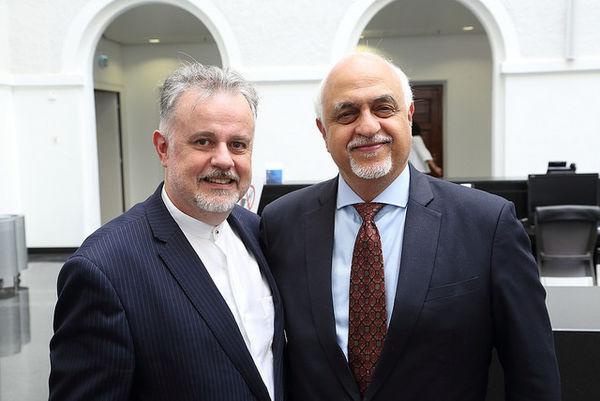Pierre Tam (left) with Chakib Belhassan, Executive Officer for the EIF Trust Fund Manager. (Photo by ©Jan Turnbull/EIF, used with permission)
Trade is an engine for sustainable growth. Multilateral trading systems and inclusive trade policies are crucial to achieving this goal.
“We need to foster trade development in our countries as trade is the best weapon to fight poverty. And, importantly, that action will include women, who are so often part of informal economies.” – Her Royal Highness Princess of Burkina Faso Abze Djigma
Over the years, attempts and efforts have been made to incorporate Least Developed Countries (LDCs) in the global trading system. But still, the trade gap between developed nations and the world’s poorest countries widens.
Today, it is more important than ever before for global leaders to bridge the divide with trade action and greater collaboration.
The recent Global Forum on Inclusive Trade for Least Developed Countries, held at the World Trade Offices in Geneva, was the first of its kind and aimed to address the need for trade action and collaboration. Global leaders sought strategies and heard from practitioners who are currently opening the doors for trade in LDCs.
Pierre Tami, Founder of Shift 360 and the ACAC, had the privilege of representing Cambodia and the Academy of Culinary Arts Cambodia at the Forum.
Pierre was invited to showcase the model of the ACAC as a Private-Public Partnership, a first in Cambodia. This innovative and creative approach brings together the government, the private sector and civil society to implement an effective initiative that ensures that youth and women can receive high quality skills education and easily access good paying jobs in the hospitality industry.
Pierre recognized the strong support the EIF has given to the ACAC as a co-financer along with the Swedish International Development Agency. Pierre also strongly endorses the call to action which was developed at the Forum as it is imperative to concretely materialize projects that reflect the spirit of the discussions formulated at the Global Forum.
Shift360, founded by Pierre Tami, fully embodies the strategy of economic empowerment of women and youth. Because of Pierre’s experience in Cambodia as a social entrepreneur, he has set up a number of high impact businesses in the food and beverage industry in Phnom Penh.
What is a ‘Least Developed Country’?
LDCs are determined through a combination of three key factors: human assets like nutrition and education, along with economic vulnerability, and per capita income. Currently, 47 countries in the world are considered LDCs, including Cambodia.
Trade as an engine for sustainable growth
During the Forum, Pierre Tami was invited as a panelist along with other global leaders, including Her Royal Highness, Princess Abze Djigma of Burkina Faso, for the high-level plenary session: “Talking trade strategies for small businesses, women and youth”.
Pierre Tami was able to share the success of the Academy of Culinary Arts Cambodia in addressing poverty reduction through education and job creation in the country.
The panel gathered ministers and leaders from LDC’s to discuss implementation of trade strategies and national-level plans and focused on opportunities and challenges to ensure regional and global trade contributes to poverty reduction and job creation, particularly for small businesses, women, and youth.
Inclusive Trade for LDCs
Roughly 300 people attended the Forum. Leaders from governments, donors, international organizations, business and academia gathered to foster trade action in LDCs and inspire deeper collaborations and commitments to support integration of LDCs in global and regional trade.
Pierre Tami represents the ACAC as a tool of trade, DEVEX article

